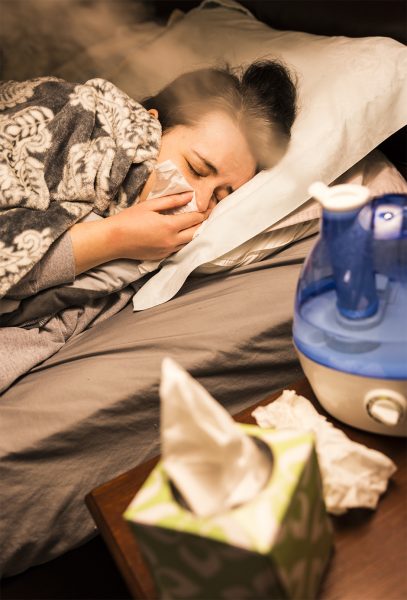Contributor
This winter, temperatures have reached record lows in Michigan and across the country. At the same time, the public’s been hit with a strain of flu that health professionals describe as particularly nasty.
That flu, H3N2, is responsible for at least 30 deaths across the nation so far.
In Washtenaw County, the Public Health Department reports two deaths as of Jan. 23, along with 149 flu hospitalizations and more than 430 lab-confirmed cases of flu.
Like the common cold, flu spreads from person to person.
The county health department notes that it is not too late to get vaccinated, and that everyone six months and older needs a flu vaccine this year.
Beyond that, there are ways to help combat sickness this season. Hope Delecke, a nurse practitioner and nursing simulation lab coordinator at WCC, shares her expertise.
Bundle up
It’s important to dress accordingly for the weather everyday, especially during winter. Weather apps, the morning news and a computer can help anyone prepare to get dressed at the start of the day. Delecke stresses that underdressing in colder temperatures can weaken the immune system’s response to fighting off any potential illnesses that may be in a person’s body. Hypothermia (the condition of having an abnormally low body temperature because of rapid heat loss) and frostbite (the freezing of body tissues) with prolonged skin exposure are serious risks, too. So, gather coats, scarves, gloves, boots and other clothing that cover your limbs and torso, especially in freezing temperatures.
Wash up
In a culture in which people are constantly touching various items in the public sphere and coming into contact with others, handwashing is the primary line of defense to halting the spread of germs and viruses.
Primarily, people need to wash their hands before eating, preparing food and after using the restroom. Delecke recommends that, throughout the day, people wash their hands after touching public items such as doorknobs, computers, bank pens, elevator buttons and people’s hands. Why? Because most of us have a habit of touching our faces and areas around it. For example, we tend to scratch our noses, apply lip balm to our lips using our fingers, or wipe something out of our eyes. These are prime locations where diseases can enter our bodies.
“Not only do you have to wash your hands, but you have to adequately wash your hands,” Delecke said. According to the Centers for Disease Control and Prevention, proper handwashing consists of using soap and running water while scrubbing all surfaces of your hands for 20 seconds. Singing “Happy Birthday” through twice in a row is an easy way to ensure that you have adequately wash your hands. Hand sanitizer and antibacterial wipes are handy substitutes when there is no bathroom nearby.
Eat up
Maintaining a healthy diet has a great influence on your body. Drinking plenty of water and eating “super foods” (foods packed with vitamins and nutrients) every day can boost your immunity. Some common superfoods are leafy vegetables, apples, berries, fish and dark chocolate.
Even though healthy eating can work wonders, Delecke notes the importance of maintaining a balance. “If you’re eating healthy … but [are] stressed [and] not sleeping enough … there will be no health benefits overall,” she said. It’s well known that many college students fail to get the recommended hours of rest and relaxation and fail to eat healthily. Delecke says that maintaining your health typically requires lifestyle changes. Instead of ditching unhealthy foods altogether, she suggests replacing parts of your meals and snacks with berries or a salad. This will help you steer clear of illnesses and make anyone feel good physically. So in the future, think about switching that processed snack for a superfood.
Clean up
Opportunities to make us sick surround us, so sanitization is needed. Cleaning the spaces people encounter the most with disinfectant will kill germs and viruses that may otherwise spread. Use disinfectant sprays and wipes to sanitize the public areas around you: your workspace, home and car. Remove objects from the surfaces, then wipe and spray them. Be sure to wait five minutes before touching or using these surfaces after disinfecting them, and wash your hands. How often should this be done? According to CleanLink.com, “the frequency of disinfection should consider the number of people touching the surface.” One person can clean a personal bathroom every two weeks, but a family bathroom should be cleaned and disinfected at least weekly.
More information
To learn more about cold and flu season and how to treat/prevent illnesses, visit cdc.gov/flu/prevent
Checklist for disease prevention
• Check the weather every morning before getting dressed
• Wash hands numerous times a day for a minimum of 20 seconds
• Cut back on junk food and squeeze in a superfood as a snack or meal
• Disinfect personal items at least once a week
• Talk to a doctor about any needed vaccinations
What about Hepatitis A?
Fliers are posted around WCC alerting students to an outbreak of the Hepatitis A virus, which has affected over 450 people in southeastern Michigan.
It is recommended that people living in southeastern Michigan perform frequent handwashing and receive a Hepatitis A vaccination. Delecke states that she hasn’t heard of any cases of Hepatitis A affecting WCC.
To find out more about the cases of Hepatitis A in Washtenaw County and to determine where you can receive a vaccination, visit http://bit.ly/2EdvU8B



